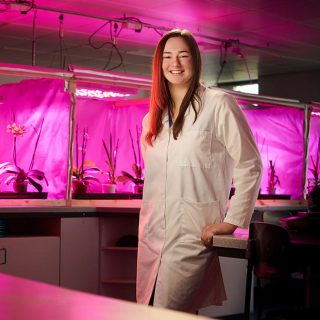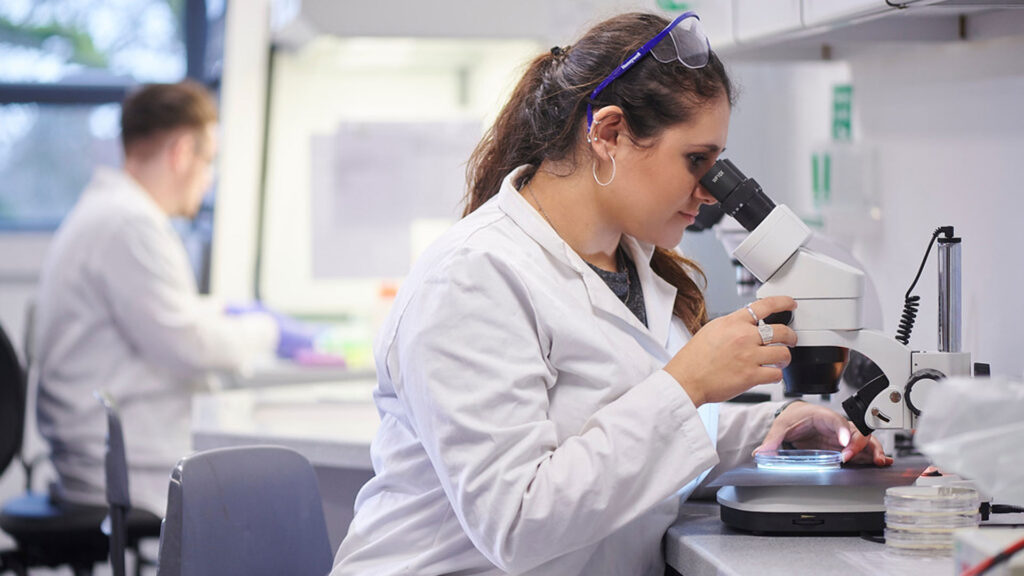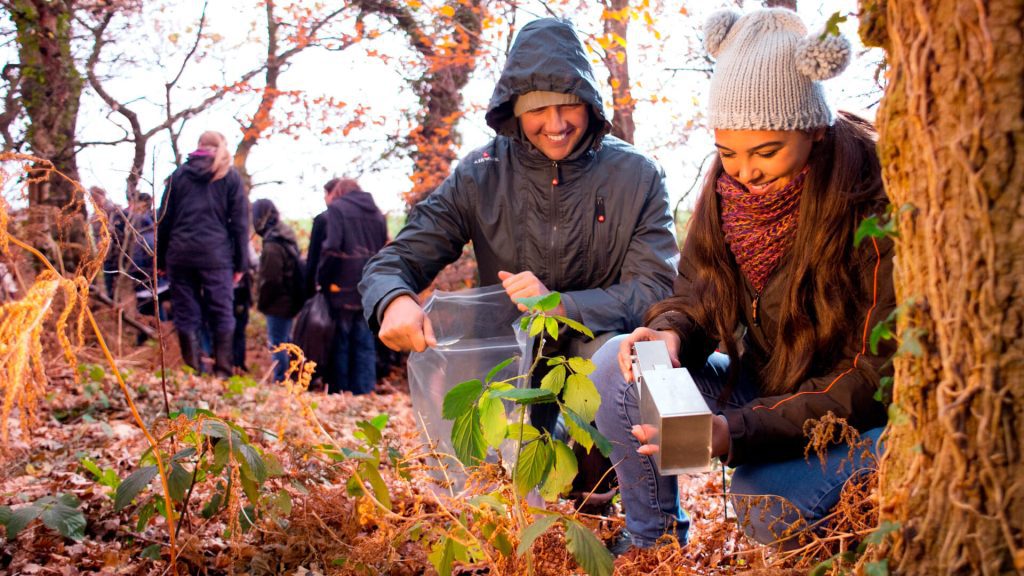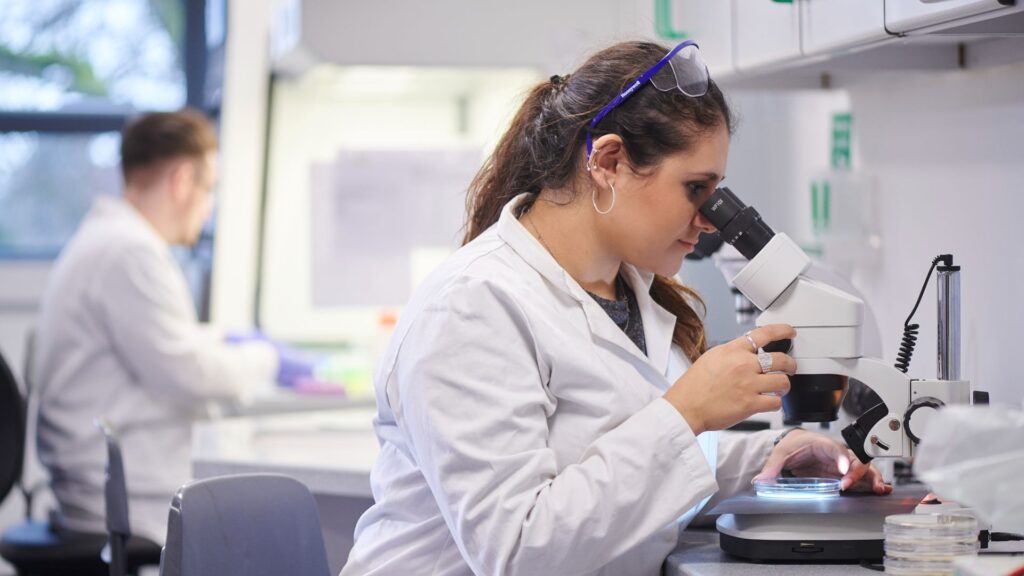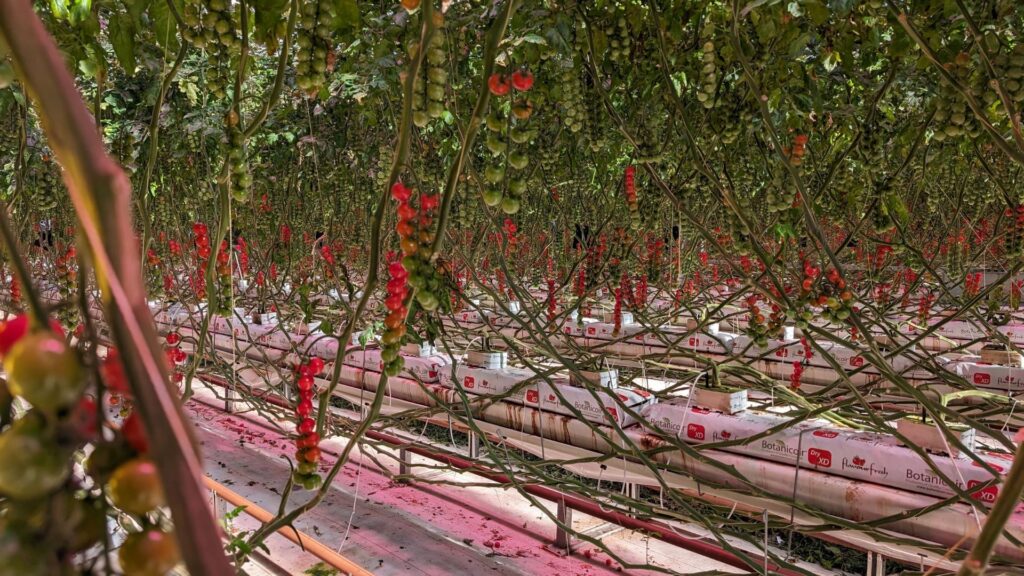Biology BSc (Hons)
UCAS code: C100
Gain experience in cellular, molecular, genetic and whole organism biology. And understand its impact on commercial and research settings. See how modern biology shapes and challenges society, and carry out fieldwork in rich locations on our BSc (Hons) Biology degree.
Overview
| Course length: | 3 years full-time 6 years part-time |
|---|---|
| Start dates: | September 2025 September 2026 |
| Location: | Edge Hill University |
| Example offers: | BBC-BBB (A Level) or DMM (BTEC) |
| Subject(s): | Biology and Biosciences |
| Faculty: | Arts and Sciences |
| Department: | Biology |
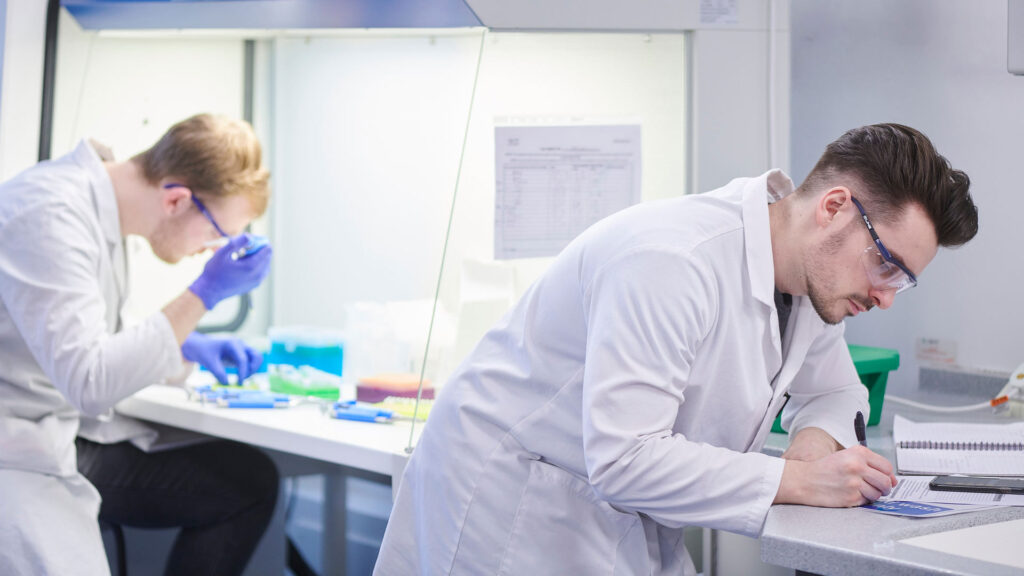
Exploring the very mysteries of life is the essence of biology. It’s at the forefront of research into global issues such as disease, cloning, food and climate change. By studying everything from molecules to ecosystems, you’ll appreciate the challenges biological advances present to society.
You’ll gain an understanding of the scope of biological knowledge on our BSc (Hons) Biology degree that’s accredited by the Royal Society of Biology. It includes extensive lab work, and fieldwork in a rich diversity of habitats. Our biology course covers a diverse range of topics in the study of living organisms. You’ll discover where your interests lie early on, and have opportunities to specialise.
A course highlight is the chance to go on field trips abroad (paid for by us), travelling to locations rich with flora and fauna. Throughout the programme you’ll receive training in biological sciences from staff who are specialists in their disciplines.
An accredited degree
Pending reaccreditation, this degree is accredited by The Royal Society of Biology which is the UK’s leading professional body for the biological sciences. Upon successful completion of the degree, you’ll be eligible for one year of free membership of the Royal Society of Biology at Associate level. As an Associate member, you’ll be able to take advantage of unique opportunities to engage with the life sciences, share your passion for biology and develop your professional network.
 Royal Society of Biology
Royal Society of Biology
Course features
-
International students can apply
-
Professional accreditation
-
Sandwich year option available
-
Studying abroad option available
What you'll study
Trace the evolution of life, examining the diversity of plants and animals. Take part in residential fieldwork, where we’ll show you how to complete biological research. And broaden your knowledge of the discipline through modules in cell biology and genetics.
In Year 2, you’ll study two compulsory modules: Research Methods in Biology and Laboratory Masterclass. You’ll also have the opportunity to tailor your degree to suit your interests by choosing four optional modules from distinct pathways (Whole Organism, Molecular/Cellular, Human Biology)
One optional module will be picked from each pathway. Your final optional module choice will be from any of the three pathways. Your modules must total 120 credits for the year and you cannot choose the same module twice.
In Year 3, you’ll complete the Biology Research Project. This offers an opportunity to complete your own research and a dissertation. You’ll apply the concepts, theories, and practical skills you’ve learnt throughout your studies. You’ll be mentored by experts in the relevant field of research, who’ll provide supervision and guidance throughout the research process. You’ll also be able to tailor your degree further with four optional modules.
One optional module will be picked from each pathway. Your final optional module choice will be from any of the three pathways. Your modules must total 120 credits for the year and you cannot choose the same module twice.
How you'll study
Our BSc (Hons) Biology programme has a strong practical base. Learning involves lectures, practical work, tutorials and fieldwork. The department has a wide range of practical facilities and we are keen to develop student skills in the areas of microscopy, microbiology, cell culture and DNA technologies. The degree also involves a period of residential fieldwork, as well as the option to take part in a range of UK-based fieldwork opportunities.
How you'll be assessed
Modules are assessed by a mixture of coursework and examinations tailored to suit the subject area of each module. An extremely wide range of coursework is employed which may include practical portfolios, specimen collections, project reports, field notebooks and website development, plus individual and group oral presentations.
Who will be teaching you
Edge Hill University has over 30 years’ experience in delivering BSc (Hons) Biology degrees and has a wealth of experienced tutors and technical staff in addition to field and laboratory equipment to support the study of biology. The Biology department is friendly and approachable and of a size that enables us to know our students personally.
Our experienced and knowledgeable staff take pride in the quality of their teaching. Their research activity means they keep up-to-date with current developments in their areas of interest and pass this knowledge onto their students.
An extensive network of relationships has been established with relevant environmental organisations and other universities in the UK and overseas, ensuring a rich, diverse and rewarding student experience. Visiting speakers assist in the delivery of the programme, often presenting unique or novel aspects of particular subjects.
Where your course includes optional modules, these are to provide an element of choice within the course curriculum. The availability of optional modules may vary from year to year and will be subject to minimum student numbers being achieved. This means that the availability of specific optional modules cannot be guaranteed. Optional module selection may also be affected by timetabling requirements. Some restrictions on optional module choice or combinations of optional modules may apply.
Entry criteria
Typical offer 112-120 UCAS Tariff points, preferably to include Biology or a related subject, such as Chemistry, Geography or Psychology, plus GCSE Mathematics at Grade C or Grade 4 or above (or equivalent).
Other subjects will be considered if you have demonstrable interest or experience in biology.
Example offers
| Qualification | Requirement |
|---|---|
| A Level | BBC-BBB. |
| UCAS Tariff points | 112-120 points. |
| BTEC Extended Diploma (or combination of BTEC QCF qualifications) | Distinction, Merit, Merit (DMM). |
| T Level | Overall grade of Merit. |
| International Baccalaureate (IB) | We are happy to accept IB qualifications which achieve the required number of UCAS Tariff points. Subject-specific requirements at Higher Level (HL) Grade 5 may apply. |
| Access to Higher Education Diploma | 45 credits at Level 3, for example 15 credits at Distinction and 30 credits at Merit or 24 credits at Distinction and 21 credits at Merit. The required total can be attained from various credit combinations. |
Please note, the above examples may differ from actual offers made. A combination of A Level and BTEC awards may also be accepted.
If you have a minimum of two A Levels (or equivalent), there is no maximum number of qualifications that we will accept UCAS points from. This includes additional qualifications such as Extended Project Qualification (EPQ), AS Levels that haven't been continued to A Level, and General Studies AS or A Level awards.
English language requirements
International students require IELTS 6.0, with a score no lower than 5.5 in each individual component, or an equivalent English language qualification.
If your current level of English is half a band, one band, or one-and-a-half bands lower, either overall or in one or two elements, you may want to consider our Pre-Sessional English course.
Fair Entry Criteria
Our new Fair Entry Criteria is a Contextual Admissions Policy that takes an applicant’s personal and educational background into account. This policy will allow eligible applicants to receive up to a two-grade reduction in their entry requirements for this course. Find out more and see if you qualify.
How to apply
Apply full-time
Read our guide to applying through UCAS to find out more about the application process.
International
Please see our international student pages for further information about how to apply as a prospective international student.
Part-time applications require a direct application to Edge Hill. Please select the year of entry that you wish to apply for.
Apply for September 2025 part-time.
Should you accept an offer of a place to study with us and formally enrol as a student, you will be subject to the provisions of the regulations, rules, codes, conditions and policies which apply to our students. These are available at www.edgehill.ac.uk/studentterms.
Call our Clearing helpline on 0800 028 6677, Monday to Friday from 9am - 5pm or complete our Clearing Application Form and get the guidance you need. Want to know more about Clearing? view our Complete Guide to Clearing 2025.
Apply through Clearing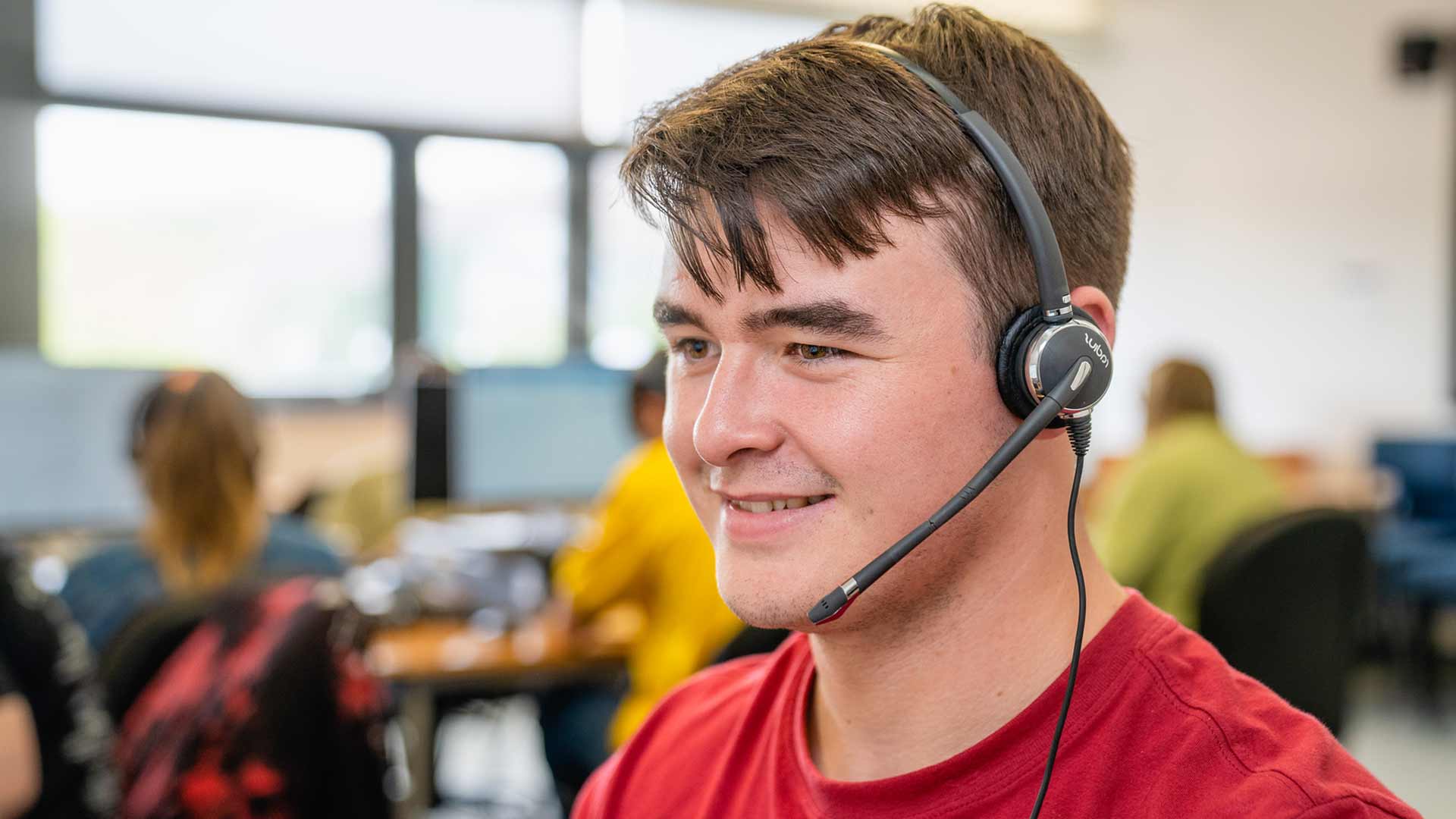
Facilities
 BSc (Hons) Biology students have access to our BioSciences building that incorporates impressive, modern laboratories, offering exciting and highly relevant practical experience in some of the best equipped facilities in the country. Resources include fluorescence and scanning electron microscopes, DNA extraction and analysis equipment, and climate controlled insectaries.
BSc (Hons) Biology students have access to our BioSciences building that incorporates impressive, modern laboratories, offering exciting and highly relevant practical experience in some of the best equipped facilities in the country. Resources include fluorescence and scanning electron microscopes, DNA extraction and analysis equipment, and climate controlled insectaries.
You will benefit from our brand-new £17.4m Life Sciences building, featuring dedicated student research labs for learning advanced cell culture and histology techniques.
A number of the best nature reserves in the country are in close proximity to the campus. You will be taught within a short travelling distance of impressive field sites such as one of the finest saltmarsh and dune systems in Europe, restored mires of international importance, hay meadows and limestone woodlands. The University also has extensive grounds including meadows which serve as a useful area for demonstrating sampling techniques.
Where you'll study
Finance
Tuition fees
UK Full-Time
£9,535
a year
UK Part-Time
£79 per credit
for 360 credits
International
£17,000
a year
EU/EEA and Swiss students who have settled or pre-settled status under the EU Settlement Scheme, as well as Irish nationals, may be eligible for the UK tuition fee rate.
Financial support
Subject to eligibility, UK students joining this course can apply for a Tuition Fee Loan from the Government to cover the full cost of tuition fees. UK students enrolling on the course may also be eligible to apply for additional funding to help with living costs.
Scholarships
We offer a range of scholarships, which celebrate the determination, commitment and achievement of our students. Many of our scholarships are awarded automatically. There are some however, where you will need to be involved in an application or nomination process. To find out more about our scholarships and check your eligibility, please visit our dedicated scholarships pages.
Money Matters
Please view the relevant Money Matters guide for comprehensive information about the financial support available to eligible UK students.
EU/EEA and Swiss students who have settled or pre-settled status under the EU Settlement Scheme may be eligible to apply for financial support. Irish nationals can ordinarily apply to Student Universal Support Ireland (SUSI). If you are an EU student who does not have settled or pre-settled status, or are an international student from a non-EU country, please see our international student finance pages.
Your future career
Our BSc (Hons) Biology students are sought-after in many specialist fields including biotechnology, microbiology, medicine, and environmental protection. You can find them working with companies like Tyler Ecological Consultancy and Perfectus Biomed, as well as in the NHS.
Other graduates have gone into teaching and research roles, or continued to postgraduate study in biology or a similar subject. We’ll help you develop skills to meet employers’ needs. When you apply for roles, they’ll see your lab-ready skillset in action through work placements and recruitment schemes.
As a graduate of a degree accredited by the Royal Society of Biology, you’ll be eligible for one year of free membership of the Royal Society of Biology at Associate level.
The Royal Society of Biology is the UK’s leading professional body for the biological sciences. As an Associate member, you’ll be able to take advantage of unique opportunities to engage with the life sciences, share your passion for biology and develop your professional network.
Course changes
Every effort has been made to ensure the accuracy of this information, however our courses are subject to ongoing review and development. Changing circumstances may necessitate alteration to, or the cancellation of, courses.
Changes may be necessary to comply with the requirements of professional bodies, revisions to subject benchmarks statements, to keep courses updated and contemporary, or as a result of student feedback. We reserve the right to make variations if we consider such action to be necessary or in the best interests of students.

